The comic adapts her bawdy, bodily routines to the realities of modern womanhood, Kate Demolder writes.
On the day that Grace Campbell, the 30-year-old comic, embarked on the biggest tour of her career, she noticed, by complete coincidence, that it had been one year to the day since she’d had an abortion.
"It feels… well, weird," she says via Zoom from her North London home, where the chintzy, pastel colours of her kitchen presses juxtapose against the topic of bodily autonomy.
"Yesterday was such a significant day. I think because for it to have been a year, and then for me to feel like I've managed to turn it around in that year and sort of turn it into this show that I'm really proud of. It felt good. I was really proud of myself yesterday. It's, like, this show is maybe not the most like, commercially viable show ever.
"Like, it's a show about an abortion. But I'm so proud of it, and I love it, and every time I finish it, I feel really happy and like I've expelled some bad energy and shed some of the shame. That’s cool, but there are also moments where, my body is still so confused. And I also thought I’d never be able to make jokes again. In that way, it feels triumphant."
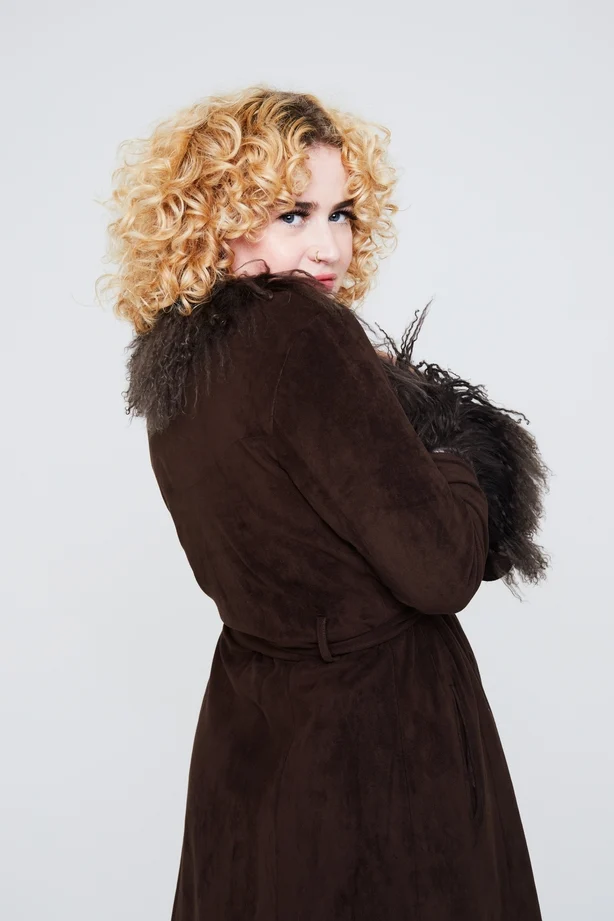
Those who follow her will know that, onstage and off, Campbell is uncommonly open. Money, politics, bursting through clothes (which happened recently while performing at Clapham Grand), alcohol-induced blackouts, injectables, sexual assault, chronic anxiety disorder, self-loathing, abortion: all the things that most people keep desperately private, Campbell airs with no evident discomfort. (She wrote about the latter, in detail, across a several-page spread for The Guardian.)
It’s difficult to imagine the likes of Jenny Slate, Catherine Tate or Sarah Millican allowing fans to see parts of themselves usually reserved for doctors' offices, close-knit WhatsApp groups or psychiatric rooms, let alone permitting this level of intimacy.
"It’s a fine line," she says. "Because I always want to be that person that people want me to be when they meet, which is this best friend character that’s up for a laugh. But then sometimes I'm like, sober, and like, have my headphones in. So that's one sort of thing that I've had to kind of accept; that I'm not going to walk away from every interaction with someone who likes my work thinking, Oh my God, they're going to be like, more obsessed with me now than ever before.
"But that said, I do have boundaries when it comes to my comedy. Like last year, when I was in America and the abortion had just happened, there was no way I was going to talk about it, because I wasn’t ready. At that point, I was still kind of in it, and I just couldn't really see the wood from the trees. You know, my Guardian article came out the week I would have had a baby, had I carried on with the pregnancy. And so I was like, Is this all a bit too soon? Have I rushed this?
"Now, I’m at a point where I do feel like it was the right thing to do. But to answer your question, like, I just try and really judge whether or not I'm ready to talk about things. I think I always will be this way. I think I'll develop better boundaries of knowing when is the right time, but I am a natural oversharer. And even thinking about what I've gone through, sharing it means other people can talk about it. And that’s why it had to happen, and that it didn’t just happen for nothing."
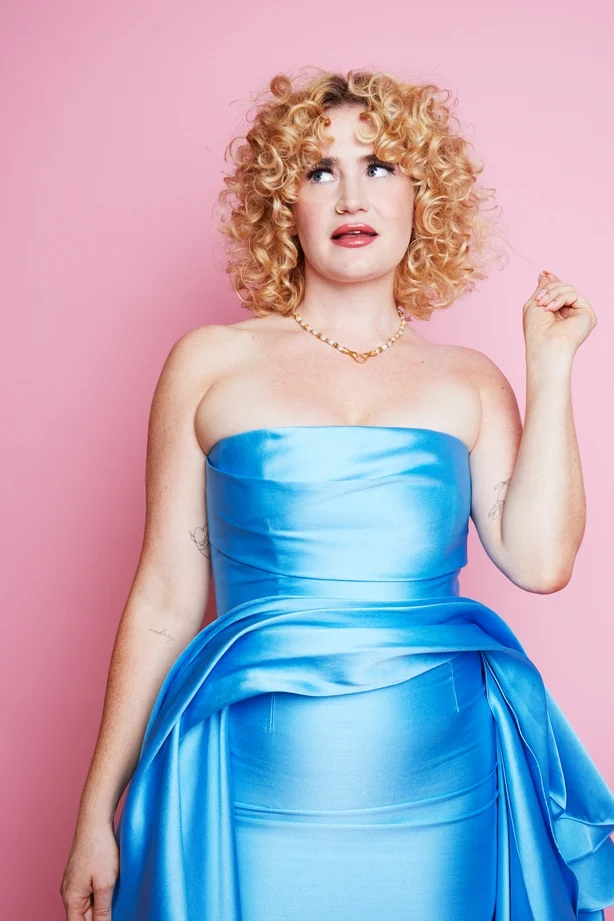
In her early work, Campbell embodied a knowing, brassy, bemired persona; the last woman at last call. In sketches, she tends towards the baffled innocent––a woman trying to accommodate whatever ignominy came her way. If men were involved, they were the idiotic beneficiaries of a system that rewarded their arrogance and cluelessness.
Campbell’s naïve avatars were caricatures, ones laden with self-parody, and yet spoke to a braying crowd; the women who have been told they were too loud, too brash, too much. That flipping of the script was a reactionary one, and an antidote to a world that insisted she fit neatly into a box of feminine subservience.
"My loudness and my, sort of… self-assuredness have always irritated men, and so there's always been a big part of me, that’s been like, I'm going to just lean into it. But then, at the same time, I've always wanted men to approve of me. I've sort of always had a bit of a complex about it. Unfortunately for everyone, I learned to embrace it. And also, I think what's cool now is that so many women are just very comfortable in that too muchness. Like, the people that come to my shows, they're all loud girls who vape and, like, drink on a Tuesday night.
"At last night’s show, there was this group of girls who were just shouting out what vape flavours they like while picking up multiple bottles of wine. Those are the girls that, like, I get to be around. And how good is that as a job?" (Though largely women-populated, a young boy and his father attended one of Campbell’s recent shows. "He told me he loved me and I burst into tears," she laughs. "Then his father said "no, he really does," and I completely collapsed.")
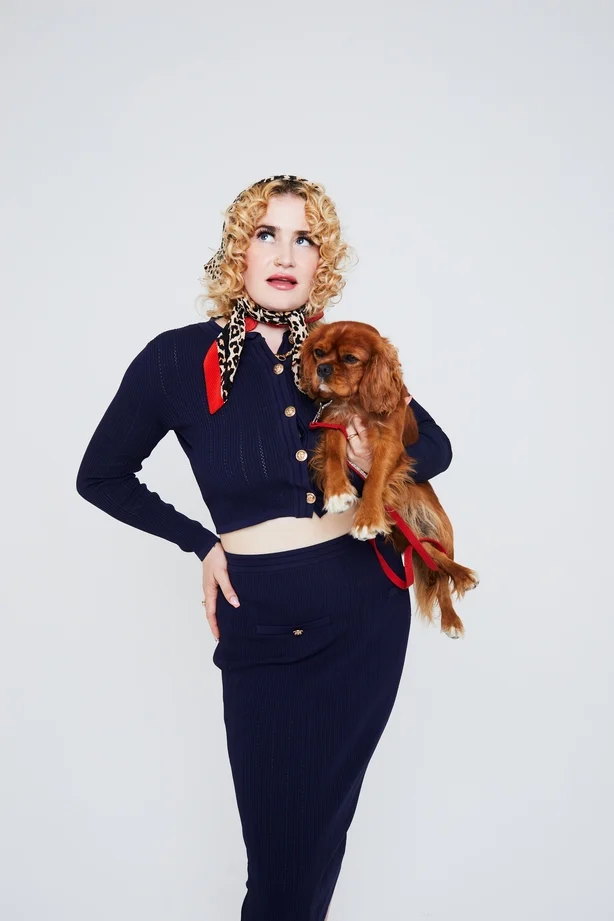
In Campbell’s comedy, her complicity in her own degradation is often the crowning absurdity, her irredeemable last laugh. She conjures, with ease, the terror most women feel at some point: that they are somehow irredeemably hideous, and unworthy of love.
It also summons the vitriol with which she has been attacked online, sentences which usually centre on two things: I don’t approve of you, and yet I want to have sex with you. (Three recent comments I noted on her Instagram were: 'Your parents must be so proud……,’ ‘Who remembers comedy?’ and ‘You look perfect in PVC. You would look luscious in Latex.’)
Her response is often defiant––sometimes she replies, more often she doesn't give the satisfaction––in that she simply changes nothing about herself to appease faceless bots. This is who she is choosing to be, whether you like it or not.
This, extends, of course to her politics. For the three people who don’t know, Campbell is the daughter of Tony and Cherie Blair’s former advisors; Alastair Campbell and Fiona Millar. The dawning of New Labour was central to her adolescence, and yet today’s crop inspire her less than the average man on London dating apps.
"I don't have any faith in Keir Starmer," she says. "And recently I’ve been asking myself: am I that political anymore? Because I don't feel aligned with the Labour Party today. And in my head, being political is supporting a party. But I am political, because I engage with it, just perhaps not in a tribal way. I feel so disconnected from the UK’s current political situation, but I’ve realised, from Rory Stewart [who presents a podcast, The Rest Is Politics, with Campbell’s father] of all people, that that’s alright. And even though my whole life I’ve felt scared of saying, I don’t support the Labour Party, right now… I really don’t."
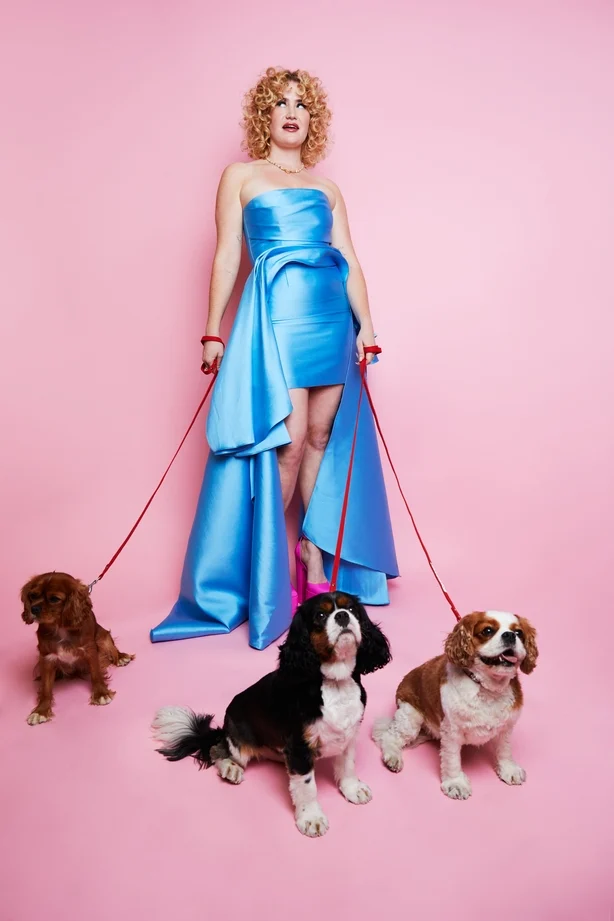
At its sharpest, Campbell’s social commentary takes bracing, unexpected turns. At its most approachable, it pokes fun at mass appeal. A recent conversation she had in the Dave studio for Alan Davies’ talk show, As Yet Untitled, centred around how she was meant to save Labour from resolute failure by hooking up with Jeremy Corbyn’s son, while another regular skit sees her father asks passers-by whether they know who she is (a lot of the time, they do not).
On stage, her bits are filthy, bawdy and laugh-out-loud in their depravity––even when her parents are in the audience. "It’s never going to be something I enjoy," she laughs, when I ask what it’s like to discuss sex around your mother. "I’m never going to be able to look them in the eye when they’re in the crowd. But, what’s good in that instance is that they can’t really reply. Like, it’s not like I call up my dad and say: I had amazing sex last night, want to hear about it?"
Campbell, and her comedy, have become that rare thing; something that caters both to Gen Z, and older demographics. "I think it resonates because I don’t really care, in that I don’t really give a f*ck," she laughs, as her King Charles Cavalier, Eddie––named for a character from Absolutely Fabulous––now sits snuggly on her chest.
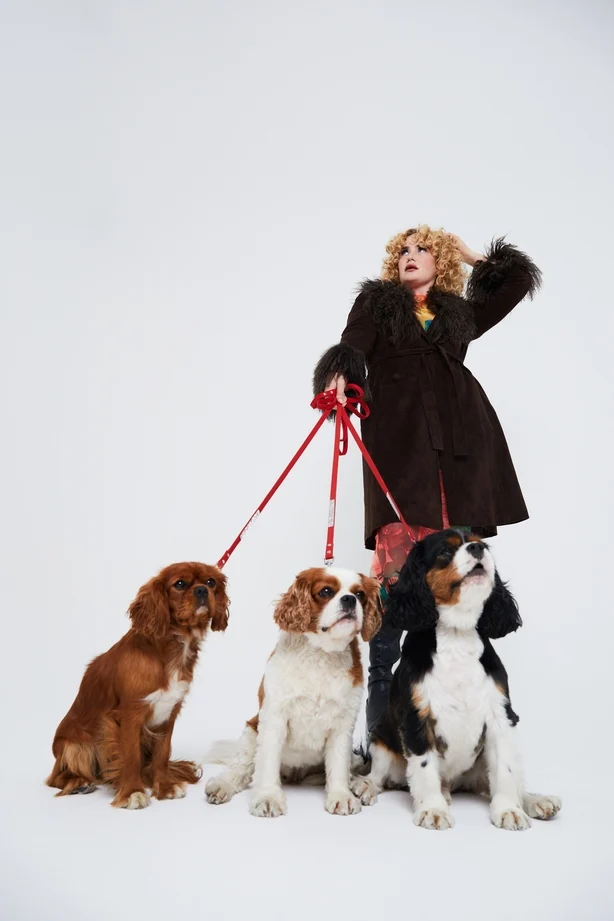
As our brief time to chat comes to a close, I ask her what is it about comedy––a gruelling, potentially humiliating business––that keeps her going. Is it the chance of money, the notoriety, the insistence of others that women are destined to fail at it?
"I think it's… the thrill of it," she says. "Like even yesterday, when I was on my way to the first show I had done in a while, I was just really excited to be on stage. That thrilling feeling, which is also a crazy form of mental illness because it's addiction and it does crazy stuff to your body. Like, I got home at midnight last night, and I couldn't get to sleep 'til, like, 3am, because I was just… rushing after a good show. Knowing that you have the capacity to make all of these people laugh or cry or even just react to things, there's something so alive about that.
"Going to watch live stand up, it's thrilling. So it's thrilling to watch it, and it's thrilling to do it, because it's completely live. And a good stand up is completely live. Like, if something happens, you have to quickly respond to it. And that's really what I love doing. Yeah, it's kind of like the only time in my life, maybe bar cold water swimming, where I feel like truly present.
"And I’m just so excited about Dublin, too. Liberty Hall is such a great venue, it’s one of the few gigs I have where I plan to go out after, and, oh, I also really want to swim in the place where Bad Sisters was filmed… could you show me where it is?"
Grace Campbell brings her show Grace Campbell Is On Heat to Liberty Hall on Friday, October 25 at 8pm. Find info and tickets here.
If you have been affected by issues raised in this story, please visit: www.rte.ie/helplines.



